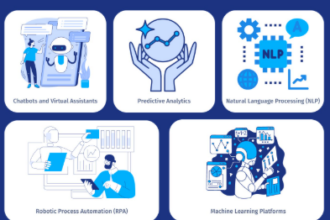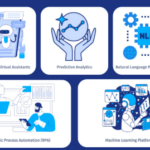This article focuses on how to choose Artificial Intelligence Business Intelligence. Using sophisticated AI-BI tools and solutions is imperative for proper data processing and the acquisition of actionable insights, thereby enhancing decision-making and effectiveness.
In this article, I examine important factors, features, and actionable strategies and practices that enable companies and organisations to determine the right tools for their specific needs and objectives.
Understanding AI in Business Intelligence
AI in Business Intelligence (BI) merges artificial intelligence (AI) and machine learning (ML) with traditional BI systems to improve analytical operations, strategic planning, and decision making.
Unlike traditional BI, which focuses on maintaining and organizing a record of data, AI-driven BI systems utilize machine learning, natural language processing (NLP) and predictive analytics to automatically recognize patterns and create actionable insights.

This shift enables businesses to improve decision making by proactively identifying opportunities and risks in real time rather than only reacting to reports.
AI offers automation of repetitive data tasks, anomaly detection, dashboard personalization and interpretation of unstructured data including social media, feedback, emails, etc. This leads to achieving operational excellence by timely and confident strategic decisions, improved customer experiences, and adopting a smart, agile, and scalable approach to manage complex data.
AI in BI, augments operational and customer support systems and decisions with actionable insights, making BI systems a necessity for any business aiming to obtain and maintain a competitive edge.
How to Choose Artificial Intelligence Business Intelligence

Define Your Business Goals
What do you want to achieve: reporting, predictive analytics, automation, or decision-making enhancement?
Evaluate Data Integration Capabilities
Determine whether the tool should interface with any existing databases, CRM, ERP, cloud services, and other data sources.
Check Advanced Analytics Features
Ensure the tool should have AI capabilities like machine learning, predictive modeling, natural language processing (NLP), and anomaly detection.
Consider User-Friendliness
Opt for tools that are designed with simple dashboards, a clear drag-and-drop analytics interface, and seamless visualization for the technical and non-technical users.
Assess Scalability and Customization
Look for tools that are capable of growing with your business and will also allow configuration for particular workflows and tailored reports.
Review Data Security and Compliance
Make sure the tool meets the necessary legal frameworks and offers data access encryption, robust access control, and peripheral security.
Evaluate Vendor Support and Community
Determine the availability of customer service and training, and the presence of active user groups for community-supported issue resolution.
Compare Costs and ROI
Examine different pricing structures, implementation expenses, and how much the organization might expect to recover on return on AI-driven insights.
What Are the Emerging Trends and Ethical Considerations in AI for Business?
Emerging Trends AI for Business
Thoughtful Analytics: Machine learning analyzes data and provides recommendations allowing for improved and quicker decisions.
Prescriptive and Predictive Artificial Intelligence: Determines what will happen in the future and what business strategies should be developed in response.
Conversational AI and Natural Language Processing: AI systems and chatbots used for customer interaction and support, as well as for internal dialogues, improves communication.
Hyperautomation: Incorporating AI-related technologies with business RPA (Robotic Process Automation) helps in process streamlining for automation of repetitive tasks.
Integrated Business Software with Artificial Intelligence: Business CRM, ERP, and BI Systems for real-time data provide AI integrated recommendations.
Intelligent Systems Focused Marketing: Marketing and customer experience automation for product suggestion and behavior based analytics helps to improve systems.
Artificial Intelligence Explanability: AI systems developed with focus on helping the user understand the rationale in the decision-making process.
Ethical Considerations AI for Businesses
Privacy and Data Protection: Protection of private and sensitive data to comply with legal frameworks e.g. GDPR is essential.
Bias and Equality: Fair workflows in AI processes to eliminate biased algorithms.
Transparency and Accountability: Trust is nurtured through business partnerships that maintain mutual respect and delineate all AI decision pathways.
Job Displacement and Workforce Impact: Integrating AI comes with sedimentary abrasion unless the organization carries all employees along through adept training and reskilling programs.
Sustainability and Environmental Impact: Sustainable practices still involve the consideration of the AI system’s energy consumption and the entire business operation’s carbon footprint.
Responsible AI Governance: Documents outlining the principles that AI and other technology applications will be subjected to, as well as the standing committees and audit processes in place, ensure the technology is ethically used.
Common Mistakes to Avoid

Ignoring Business Goals
When there is a lack of tool’s purpose based on the objectives, the tool’s effectiveness and value is lost.
Focusing Only on Features
Focusing so much on features that do not work on tools usability, integration, and overall user experience will lead to improper adoption.
Overlooking Data Integration Challenges
Failure to ensure an organization’s databases, cloud applications, and systems will enable successful integration, resulting in significant barriers to implementation.
Neglecting User Friendliness
Technical users with little understanding of the tools may struggle with them, hampering the overall adoption rate.
Underestimating Security and Compliance
Exposing the organization to avoidable risks resulting from inadequate data protection is far from ideal.
Failing to Plan For Scalability
Tools that lack flexibility will quickly become outdated, resulting in complicated and expensive replacements.
Skipping Pilot Testing
The chances of poor ROI gets heightened when the implementation phase is absent from the entire planning that has to be done beforehand.
Ignoring Vendor Support and Community
Without assistance from proper support people, the tool’s effectiveness can be hindered dramatically.
Conclusion
Strategic selection of Business Intelligence (AI powered) tools helps determine what data is actionable, and drives growth strategy. Organizations can set goals, assess tool integration, review the AI components, and determine ease of use to find suitable tools.
Considerations of long term value such as scalability and data security, as well as vendor assistance and pricing are also crucial.
Usability and lack of pilot testing are avoided to maximize ROI. Evaluation and deployment strategy helps leverage the use AI powered Business Intelligence tools. These too reinforce decision making, operational efficiency, and competitive advantage.
FAQ
Why should businesses use AI-BI tools?
AI-BI tools help automate data analysis, identify trends, detect anomalies, and provide actionable insights faster than traditional BI, improving efficiency and decision-making.
How do I select the right AI-BI tool for my business?
Start by defining your business goals, evaluating data integration capabilities, checking AI-driven features, ensuring usability, assessing security, and reviewing vendor support and costs.
Should I run a pilot before implementing AI-BI tools?
Yes. A pilot allows you to test usability, performance, and relevance to your business, minimizing risk and ensuring better ROI.
What common mistakes should I avoid when choosing AI-BI tools?
Avoid ignoring business goals, focusing only on features, overlooking integration challenges, neglecting user adoption, and skipping security or compliance considerations.
Can small businesses benefit from AI-BI tools?
Absolutely. Many AI-BI tools offer scalable and cost-effective solutions tailored for small to medium-sized businesses, enabling smarter decisions without heavy investment.














